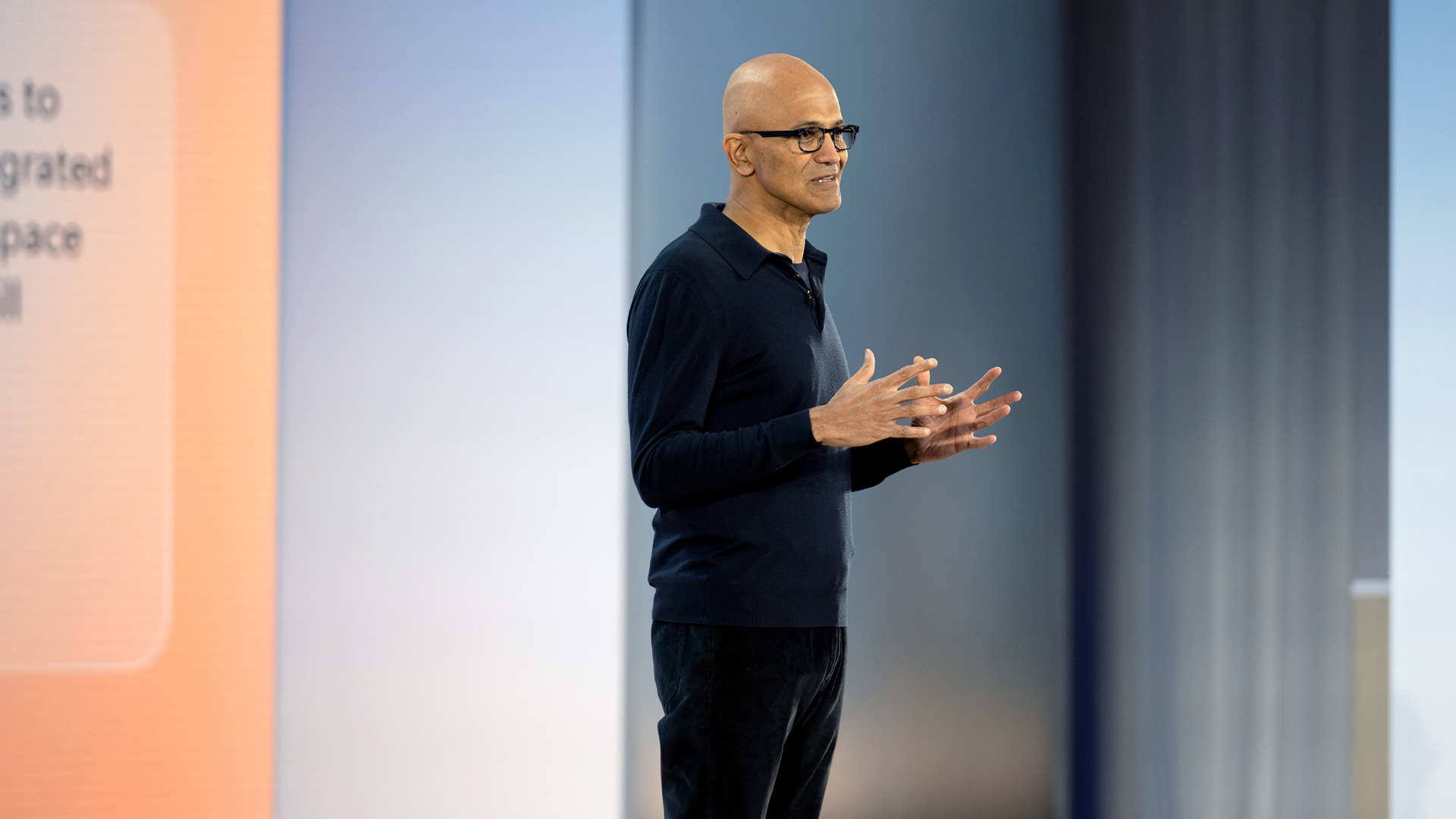‘The entire forecasting business process changed’: Microsoft CEO Satya Nadella says Excel changed the game for enterprises in 1985 – he’s confident AI tools will do the same
The Microsoft CEO says we need to change how we measure the value of AI


AI is yet to have the same transformative impact on business and knowledge work akin to the launch of Excel, according to Microsoft CEO Satya Nadella, but he appears confident a big breakthrough is looming on the horizon.
Speaking on Dwarkesh Patel’s podcast, Nadella harkened back to Microsoft Excel and its impact on financial forecasting in years gone by, which involved the exchange of faxes and hard copies - an often laborious process which, upon reflection, significantly impeded enterprise efficiency.
“Faxes went around, somebody then got those faxes and then did an inter-office memo that then went around and people entered numbers … ultimately, a forecast came, maybe just in time for the next quarter,” Nadella said.
“Then somebody said, ‘hey, I'm just going to take an Excel spreadsheet, put it an email, send it around, people will go edit it, and I'll have a forecast,’” Nadella added.
"So the entire forecasting business process changed because the work, the work artefact and the workflow changed.”
Ultimately, this is what needs to happen with AI being introduced into knowledge work, Nadella noted.
The Microsoft chief exec spoke about how his own work processes have changed as he’s begun to use AI, mentioning that he had even deployed Copilot in preparation for this podcast.
Get the ITPro daily newsletter
Sign up today and you will receive a free copy of our Future Focus 2025 report - the leading guidance on AI, cybersecurity and other IT challenges as per 700+ senior executives
This shift towards AI becoming a major presence in staff workflows will take time though, he thinks, with management teams and individuals engaged in knowledge work having to gradually shift processes towards AI use.
Changing the metric on AI success
Nadella also focused on how the industry at large is measuring the success of AI, particularly regarding how it impacts the global economy and creates market value.
In particular, he hit out at the industry fixation on achieving artificial general intelligence (AGI), which represents the point at which AI can match or surpass human cognitive capabilities.
Sam Altman, CEO of OpenAI, Microsoft’s leading partner on the technology, has been highly vocal about the company’s work toward achieving this goal in recent years.
“Us self claiming some AGI milestone - that's just nonsensical benchmark hacking to me,” Nadella said.
RELATED WHITEPAPER

Notably, Nadella said the real benchmark for AI’s success is the world growing in economic terms.
The same principle could be applied to AI success within businesses. Firms need to keep their focus on what value AI products are driving within companies and within staff workflows.
Speaking to ITPro, Dom Couldwell, head of field engineering EMEA at DataStax, agreed with this outlook, noting that AI projects should be “judged on the value that they deliver to the business" - be that in terms of a return on investment (ROI) or the additional benefits afforded to individual workers using the tech.
“Without those specific metrics, it is hard to justify the spending and take a project from proof of concept into production, particularly at scale,” he said.
How can businesses get value out of AI?
The most successful AI projects are the ones that begin by focusing on the value side first and then work backward, Couldwell said, rather than those which haphazardly dive into the tech and try to establish a use case via experimentation.
Successful firms look for a ‘Minimal Viable Product (MVP)’ as opposed to over-engineering, he added. This means asking what the minimum level of complexity needed is.
“The added risk around Gen AI projects is that teams are adopting this new tech for the sake of it versus really needing it or having that solid business case in the first place. While there might be demand from the business to be seen to be doing something around AI, taking the time to investigate and test beforehand will pay off,” Couldwell said.
“In terms of how to approach this, my advice with the companies I have worked with would be to pressure test the approach - pick a project that is directly linked to how the business makes more revenue or saves significant costs in order to put together a project, but not an area that is too tied to other processes,” he added.
This process ensures that businesses can build with AI and demonstrate what’s effective before looking at larger projects that can benefit from the lessons learned along the way.
Is AI delivering for businesses?
There are mixed reports from companies as to how effectively AI is delivering value in businesses, though Microsoft itself claimed late last year that generative AI tools offer a return on investment (ROI) of $3.70 for every dollar invested.
The report also claimed that AI deployments take under eight months to roll out, with ROI delivered within 13 months.
Other research has been less positive, though, with research from Appen in October 2024 suggesting that ROI from AI has dropped significantly over the last three years due to data issues.
While 56.7% of AI projects delivered meaningful ROI in 2021, the report found, this figure dropped to 53.5% in 2022 and 51.9% the year after. By 2024, meaningful ROI delivery had sunk to 47.3%.
MORE FROM ITPRO
- AI was touted as a game changer for productivity – but employees are still saddled with growing workloads
- Microsoft exec touts benefits of AI productivity gains
- AI could be the key to solving the UK’s productivity problem

George Fitzmaurice is a former Staff Writer at ITPro and ChannelPro, with a particular interest in AI regulation, data legislation, and market development. After graduating from the University of Oxford with a degree in English Language and Literature, he undertook an internship at the New Statesman before starting at ITPro. Outside of the office, George is both an aspiring musician and an avid reader.
-
 Bigger salaries, more burnout: Is the CISO role in crisis?
Bigger salaries, more burnout: Is the CISO role in crisis?In-depth CISOs are more stressed than ever before – but why is this and what can be done?
By Kate O'Flaherty Published
-
 Cheap cyber crime kits can be bought on the dark web for less than $25
Cheap cyber crime kits can be bought on the dark web for less than $25News Research from NordVPN shows phishing kits are now widely available on the dark web and via messaging apps like Telegram, and are often selling for less than $25.
By Emma Woollacott Published
-
 Meta executive denies hyping up Llama 4 benchmark scores – but what can users expect from the new models?
Meta executive denies hyping up Llama 4 benchmark scores – but what can users expect from the new models?News A senior figure at Meta has denied claims that the tech giant boosted performance metrics for its new Llama 4 AI model range following rumors online.
By Nicole Kobie Published
-
 Fake it till you make it: 79% of tech workers pretend to know more about AI than they do – and executives are the worst offenders
Fake it till you make it: 79% of tech workers pretend to know more about AI than they do – and executives are the worst offendersNews Tech industry workers are exaggerating their AI knowledge and skills capabilities, and executives are among the worst offenders, new research shows.
By Nicole Kobie Published
-
 Sourcetable, a startup behind a ‘self-driving spreadsheet’ tool, wants to replicate the vibe coding trend for data analysts
Sourcetable, a startup behind a ‘self-driving spreadsheet’ tool, wants to replicate the vibe coding trend for data analystsNews Sourcetable, a startup developing what it’s dubbed the world’s first ‘self-driving spreadsheet’, has raised $4.3 million in funding to transform data analysis.
By Ross Kelly Published
-
 DeepSeek and Anthropic have a long way to go to catch ChatGPT: OpenAI's flagship chatbot is still far and away the most popular AI tool in offices globally
DeepSeek and Anthropic have a long way to go to catch ChatGPT: OpenAI's flagship chatbot is still far and away the most popular AI tool in offices globallyNews ChatGPT remains the most popular AI tool among office workers globally, research shows, despite a rising number of competitor options available to users.
By Ross Kelly Published
-
 Microsoft launches new security AI agents to help overworked cyber professionals
Microsoft launches new security AI agents to help overworked cyber professionalsNews Microsoft is expanding its Security Copilot service with new AI agents to help overworked IT teams deal with surging security threats.
By Bobby Hellard Published
-
 ‘DIY’ agent platforms are big tech’s latest gambit to drive AI adoption
‘DIY’ agent platforms are big tech’s latest gambit to drive AI adoptionAnalysis The rise of 'DIY' agentic AI development platforms could enable big tech providers to drive AI adoption rates.
By George Fitzmaurice Published
-
 Fit for artificial intelligence
Fit for artificial intelligencewhitepaper Ensure data availability to applications and services with hybrid cloud storage
By ITPro Published
-
 Fit for AI
Fit for AIwhitepaper Ensure data availability to applications and services with hybrid cloud storage
By ITPro Published